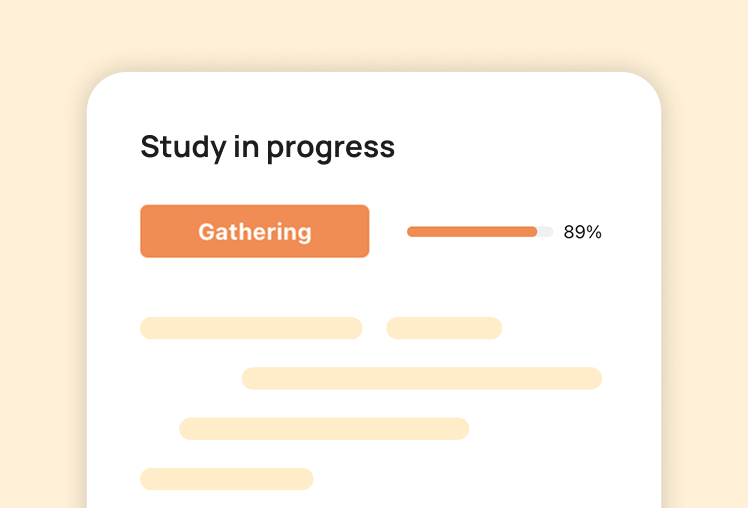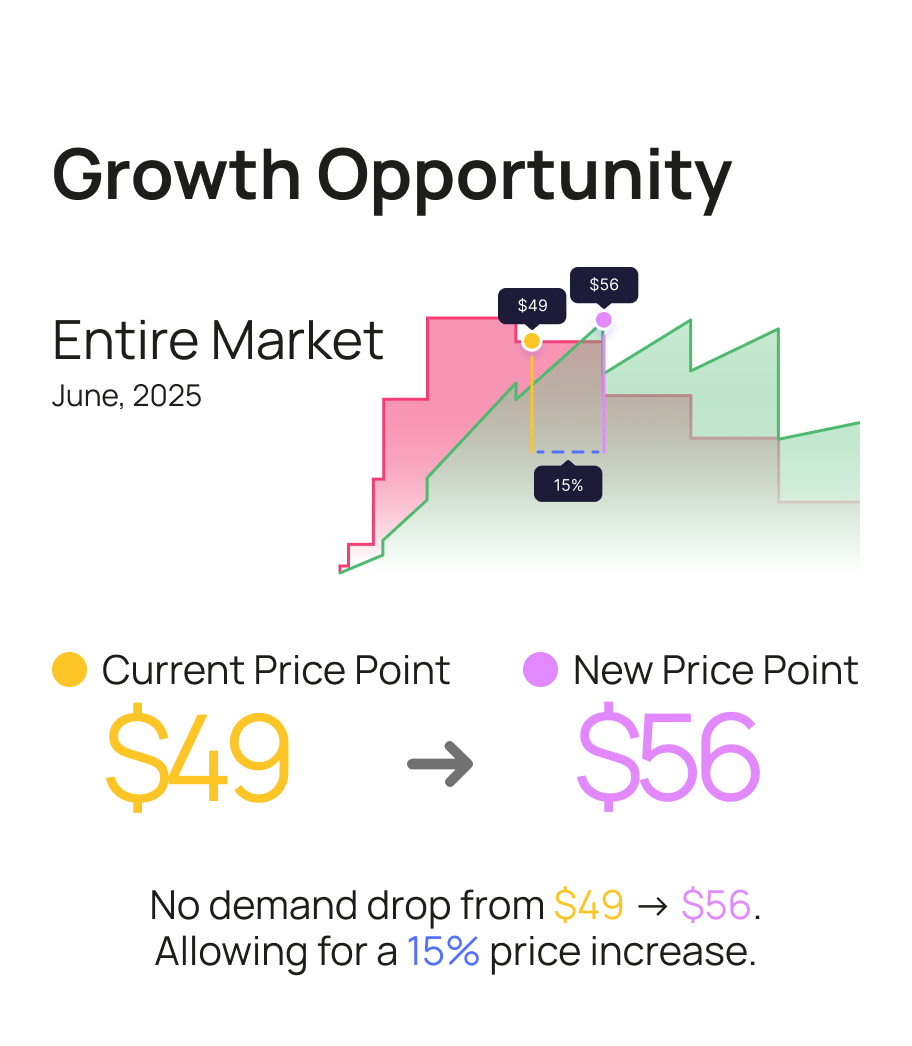This is pricing
Not guessing. Not hoping. Not waiting.
See what real buyers are willing to pay. Find the price points that drive more sales, higher revenue and better margins within hours.












Pricing used to be a hassle. Not anymore
No experts. No complex projects. No delays. Get current and future demand based on willingness to pay in just a few hours. That means you can act before the dip, not after. Run pricing studies that are easy to launch, repeat, and act on, with actionable insights delivered in hours, not weeks.




Own your pricing. Completely
Decide when, where, and how to price, without waiting on consultants or internal gatekeepers. Launch studies in minutes and adapt pricing strategies across products, markets, and segments. It’s your process, your data, your strategy, on your terms.
Stop leaving money on the table
See exactly who will pay what
Stop guessing. Get the full demand curve. See willingness to pay by segment, down to product attributes and sales channels. Spot plateaus, price walls and identify your best pricing opportunities.
Know your most profitable price
Discover exactly which price maximizes your revenue. Make confident, data-driven decisions to capture your full revenue potential, fast.


Transform the way you do pricing
Real buyers on a massive scale
Access insights from 300+ million verified buyers in 130+ countries, including your own customers or even your competitors’ audiences. Our automated, scalable platform makes it easy to gather genuine feedback fast, with no expertise required. Discover exactly what people will pay and unlock new revenue opportunities.


Pinpoint your best price points
Turn real buyer data into clear, actionable insights, showing exactly how demand and revenue shift at each price point. Pinpoint the price that drives profits, see which segments pay more, and measure in real time how small changes affect your bottom line.


Unlock your pricing insights

1. Select study
Tell us about your product and company, and let our AI handle the rest. Our proven automated studies ensure reliable data, so you can launch a study in minutes without any prior experience.

2. Gather data
We collect high-quality consumer responses selected from a pool of 300M+ people on 130+ markets. Our time-tested algorithm ensures statistically significant insights into what customers are willing to pay.

3. Analyze & report
Instantly uncover price walls, demand plateaus, optimal price points, and revenue opportunities. Use data-driven insights to make confident pricing decisions.
Don’t take our word for it.
See what our customers say.


Results that speak volumes
Many customers see a 10x ROI within months of implementing our platform’s insights. Our data also shows an average potential of 15% increase in revenue, without sacrificing unit demand, once those insights are put into action. These are the results we help forward-thinking companies achieve every day.
Revenue Increase
Frequently asked questions
What does Priceagent do?
Priceagent is the world’s first SaaS platform built to help businesses make smarter, faster, and more profitable pricing decisions based on customer willingness to pay. Powered by a proprietary algorithm refined over 10 years, Priceagent captures real-time customer insights and visualizes the full demand and revenue curve—uncovering key price walls and plateaus to deliver precise, actionable insights.
Who benefits from our service?
Our services benefit companies looking to raise prices without losing customers, expand into new markets with different buying dynamics, or set the right price for a new product or service. Businesses can also use our insights to assess their position against competitors, refine marketing messages, and identify the most valuable customer segments. We help companies fix underperforming products by understanding what drives purchases and at what price. For businesses considering an upgrade to their service, we validate demand and determine how much customers are willing to pay.
How can a company be confident in the accuracy?
Priceagent is built on a decade of real-world pricing expertise, with a proprietary algorithm refined through 2.000+ successful projects. Trusted by over 1.500 global companies across industries, we deliver predictive insights with unparalleled precision.
Our approach is backed by millions of data points on customer willingness to pay. Many clients run multiple studies, and not a single company has ever rejected our results or questioned their accuracy. With PriceAgent, you take control of your pricing decisions, backed by a globally tested, proven methodology.
Does Priceagent’s method always work?
Yes, every time.
Are you GDPR compliant?
We do not store any personal information about the respondents in our studies.
What additional insights does Priceagent provide?
Priceagent delivers insights beyond pricing, such as which product benefit drives the highest price, where and when customers prefer to buy, and how pricing varies across demographics, seasons, and sales channels. It can also reveal which customer segment is willing to pay the most and which product attribute maximizes revenue, even comparing pricing potential across different platforms like Facebook and Instagram.
How is Priceagent different from other pricing services?
Priceagent replaces outdated pricing research that relies on competitor pricing, data mining, and historical sales. Traditional methods assume competitors price correctly and that past data predicts future behavior, both often wrong. Making decisions based on these can lead to costly mistakes.
Instead, we use real people and real demand to measure willingness to pay, giving you precise, forward-looking insights at a fraction of the cost of traditional market studies. You stay in full control, running studies yourself and getting answers in hours. With PriceAgent, you can continuously measure and adjust your pricing, ensuring you always stay ahead.
Can i trust the respondents in the studies and who are they?
We have real-time access to over 300 million people across 130+ countries, ensuring a diverse and relevant respondent pool for every study. To maintain data quality, each respondent undergoes multiple layers of verification before participating. AI-driven fraud detection screens out bots, duplicates, and low-quality responses, while secure survey connections prevent manipulation. Third-party fraud prevention adds another layer of security, ensuring only real and engaged individuals take part.
Beyond this rigorous quality controls, respondents go through qualification and disqualification steps at the beginning of each survey to ensure they match the target audience. Typically, 40%–60% are disqualified upfront, with another 10%–15% removed in post-processing for inconsistent or unreliable answers. This guarantees that only a statistically significant and trustworthy set of respondents remains, providing precise and reliable insights.
What ROI can i expect?
It depends on your sales volume and current pricing, but our studies typically reveal a 15% revenue increase potential without losing sales volume. A common rule of thumb is that businesses gain at least ten times our fees within 12 months of implementing our recommendations.
What method do you use to measure willingness to pay?
Priceagent utilizes a method that has been developed for many years. We have made enhancement to the popular Van Westendorp Price Sensitively Meter (PSM); the questions are asked in context of purchasing. These questions are also dynamic and can change with specific respondent. The analytic side of the PSM is also enhanced, leading to at least an order of magnitude better precision of the results. To achieve this, we developed our own software which we call our Predictive Demand Engine™. The use of proprietary software also substantially speeds up the analytic process and reduces cost.
The pricing platform behind thousands of successful companies













